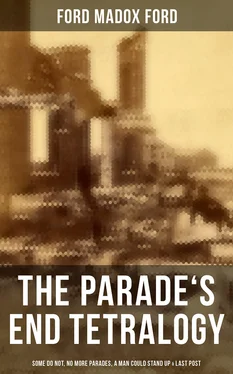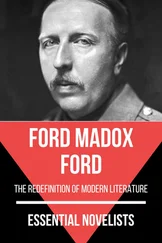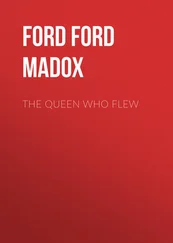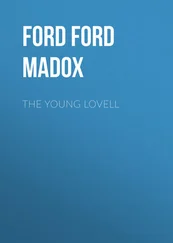When he paid the cabman, in front of a grey cement portal with a gabled arch, reaching up, he said:
‘You’ve been giving the mare less liquorice in her mash. I told you she’d go better.’
The cabman, with a scarlet, varnished face, a shiny hat, a drab box-cloth coat and a gardenia in his buttonhole, said:
‘Ah! Trust you to remember, sir.’
In the train, from beneath his pile of polished dressing and despatch cases—Tietjens had thrown his immense kitbag with his own hands into the guard’s van—Macmaster looked across at his friend. It was, for him, a great day. Across his face were the proof-sheets of his first, small, delicate-looking volume . . . A small page, the type black and still odorous! He had the agreeable smell of the printer’s ink in his nostrils; the fresh paper was still a little damp. In his white, rather spatulate, always slightly cold fingers was the pressure of the small, flat, gold pencil he had purchased especially for these corrections. He had found none to make.
He had expected a wallowing of pleasure—almost the only sensuous pleasure he had allowed himself for many months. Keeping up the appearances of an English gentleman on an exiguous income was no mean task. But to wallow in your own phrases, to be rejoiced by the savour of your own shrewd pawkiness, to feel your rhythm balanced and yet sober—that is a pleasure beyond most, and an inexpensive one at that. He had had it from mere ‘articles’—on the philosophies and domestic lives of such great figures as Carlyle and Mill, or on the expansion of inter-colonial trade. This was a book.
He relied upon it to consolidate his position. In the office they were mostly ‘born,’ and not vastly sympathetic. There was a sprinkling, too—it was beginning to be a large one—of young men who had obtained their entry by merit or by sheer industry. These watched promotions jealously, discerning nepotic increases of increment and clamouring amongst themselves at favouritisms.
To these he had been able to turn a cold shoulder. His intimacy with Tietjens permitted him to be rather on the ‘born’ side of the institution, his agreeableness—he knew he was agreeable and useful!—to Sir Reginald Ingleby protecting him in the main from unpleasantness. His ‘articles’ had given him a certain right to an austerity of demeanour; his book he trusted to let him adopt an almost judicial attitude. He would then be the Mr Macmaster, the critic, the authority. And the first-class departments are not averse to having distinguished men as ornaments to their company; at any rate the promotions of the distinguished are not objected to. So Macmaster saw—almost physically—Sir Reginald Ingleby perceiving the empressement with which his valued subordinate was treated in the drawing-rooms of Mrs Leamington, Mrs Cressy, the Hon. Mrs de Limoux; Sir Reginald would perceive that, for he was not a reader himself of much else than Government publications, and he would feel fairly safe in making easy the path of his critically gifted and austere young helper. The son of a very poor shipping clerk in an obscure Scotch harbour town, Macmaster had very early decided on the career that he would make. As between the heroes of Mr Smiles, an author enormously popular in Macmaster’s boyhood, and the more distinctly intellectual achievements open to the very poor Scot, Macmaster had had no difficulty in choosing. A pit lad may rise to be a mine owner; a hard, gifted, unsleeping Scots youth, pursuing unobtrusively and unobjectionably a course of study and of public usefulness, will certainly achieve distinction, security, and the quiet admiration of those around him. It was the difference between the may and the will , and Macmaster had had no difficulty in making his choice. He saw himself by now almost certain of a career that should give him at fifty a knighthood, and long before that a competence, a drawing-room of his own and a lady who should contribute to his unobtrusive fame, she moving about, in that room, amongst the best of the intellects of the day, gracious, devoted, a tribute at once to his discernment and his achievements. Without some disaster he was sure of himself. Disasters come to men through drink, bankruptcy, and women. Against the first two he knew himself immune, though his expenses had a tendency to outrun his income, and he was always a little in debt to Tietj ens. Tietjens fortunately had means. As to the third, he was not so certain. His life had necessarily been starved of women and, arrived at a stage when the female element might, even with due respect to caution, be considered as a legitimate feature of his life, he had to fear a rashness of choice due to that very starvation. The type of woman he needed he knew to exactitude: tall, graceful, dark, loose-gowned, passionate yet circumspect, oval-featured, deliberate, gracious to everyone around her. He could almost hear the very rustle of her garments.
And yet . . . He had had passages when a sort of blind unreason had attracted him almost to speechlessness towards girls of the most giggling, behind-the-counter order, big-bosomed, scarlet-cheeked. It was only Tietjens who had saved him from the most questionable entanglements.
‘Hang it,’ Tietjens would say, ‘don’t get messing round that trollop. All you could do with her would be to set her up in a tobacco shop, and she would be tearing your beard out inside the quarter. Let alone you can’t afford it.’
And Macmaster, who would have sentimentalized the plump girl to the tune of Highland Mary , would for a day damn Tietjens up and down for a coarse brute. But at the moment he thanked God for Tietj ens. There he sat, near to thirty, without an entanglement, a blemish on his health, or a worry with regard to any woman.
With deep affection and concern he looked across at his brilliant junior, who hadn’t saved himself. Tietjens had fallen into the most barefaced snare, into the cruellest snare, of the worst woman that could be imagined.
And Macmaster suddenly realized that he wasn’t wallowing, as he had imagined that he would, in the sensuous current of his prose. He had begun spiritedly with the first neat square of a paragraph . . . Certainly his publishers had done well by him in the matter of print:
‘Whether we consider him as the imaginer of mysterious, sensuous and exact plastic beauty; as the manipulator of sonorous, rolling and full-mouthed lines; of words as full of colour as were his canvases; or whether we regard him as the deep philosopher, elucidating and drawing his illumination from the arcana of a mystic hardly greater than himself, to Gabriel Charles Dante Rossetti, the subject of this little monograph, must be accorded the name of one who has profoundly influenced the outward aspects, the human contacts, and all those things that go to make up the life of our higher civilization as we live it to-day . . . ’
Macmaster realized that he had only got thus far with his prose, and had got thus far without any of the relish that he had expected, and that then he had turned to the middle paragraph of page three—after the end of his exordium. His eyes wandered desultorily along the line:
‘The subject of these pages was born in the western central district of the metropolis in the year . . . ’
The words conveyed nothing to him at all. He understood that that was because he hadn’t got over that morning. He had looked up from his coffee-cup—over the rim—and had taken in a blue-grey sheet of notepaper in Tietjens’ fingers, shaking, inscribed in the large, broad-nibbed writing of that detestable harridan. And Tietjens had been staring—staring with the intentness of a maddened horse—at his, Macmaster’s, face! And grey! Shapeless! The nose like a pallid triangle on a bladder of lard! That was Tietjens’ face . . .
Читать дальше












